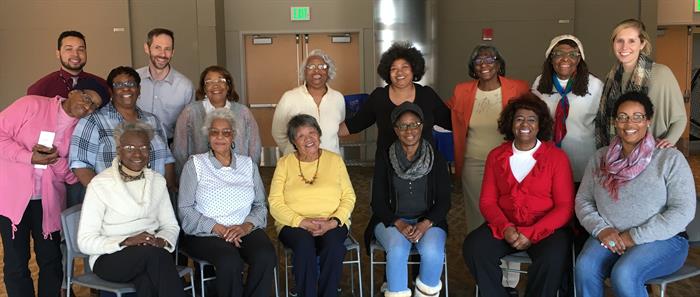Volunteers Become Educators in their Community
Using "Boot Camp Translation"

Boot Camp Translation Participants
“Did you know that people of color are at a higher risk of Alzheimer’s disease? Let’s learn why. Let’s talk about us.”
The statement is one of the key messages that came out of a community outreach initiative sponsored by the University of Colorado (CU) Alzheimer's and Cognition Center called Boot Camp Translation, or BCT. Fifteen African American women from around metro Denver volunteered to learn more about Alzheimer’s disease and related dementias so they could inspire and encourage their neighbors and friends to become better informed about the disease.
“These women are strong advocates for health and for their communities. This process further empowers them to educate and help their communities,” said neuropsychologist Luis Medina, PhD, who led the BCT along with Rebecca Mullen, MD, a family medicine physician.
Why call it Boot Camp Translation?
The BCT model originated in the Department of Family Medicine at the University of Colorado School of Medicine and was effective in rural Colorado communities for education on conditions such as diabetes, asthma and colon cancer. The name comes from concentrating so intently on a subject that a participant might feel like it is military basic training – “boot camp”– and then reframing the medical references to common language – “translation.” Participants in a BCT are encouraged to lead and teach about the health issue in their communities, supported by the information learned in BCT sessions.
The BCT was organized to encourage more people of color to see a doctor when showing signs of dementing diseases. African Americans over age 65 are two times more likely to get Alzheimer’s disease relative to Caucasians, but statistically, they are less likely to see a physician or participate in research studies. Researchers want more ethnically and racially diverse volunteers for dementia studies and trials, especially for new drug therapies, because a lack of diversity in a study population could invalidate results.
This was the first time BCT was employed for Alzheimer’s disease. CU Alzheimer's and Cognition Center neurologists Samantha Holden, MD, and Peter Pressman, MD, provided the dementia education. Participants met both in person and by conference calls over a five-month period.
Check Your M.O.O.D.
Throughout the course, the participants developed key messages to share with their community, then an action plan outlining various media outlets to share the messages. They brainstormed locations where participants felt they would have the greatest impact, including faith, community and health care locations. One message invented a new acronym, MOOD (memory, organization, oration, decisions), representing daily functions where symptoms of dementia might appear. The slogan was printed on a flyer with a picture of an older African American. “Life brings about changes; check your MOOD,” it reads.
A thousand flyers were distributed to regional churches at a convention of Baptist church ushers, and another thousand were given to the participants to share with their communities.
The participants were both enthusiastic and grateful for the BCT opportunity. One said her experience “broadened my knowledge about Alzheimer’s disease, most especially the need and avenues to educate my community about the disease and related health.”
Another wrote, “I want to thank you for your hard work and time you and your team invested in the Boot Camp. It has been a blessing to me.”
Fourteen members of the group are maintaining an ongoing relationship with the CU Alzheimer's and Cognition Center as part of a Community Advisory Committee.